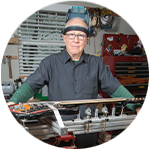Using Behlen Naphtha Solvent
V-0775
Naphtha cleans, degreases and raises wood grain for sanding before finishing.
Video Transcription
Dan Erlewine: [on screen text reads: Dan Erlewine - Stewart MacDonald] The solvent I use most is Naphtha.
Cleaning dirty hardware
It makes a great cleaner for dirty hardware. I add a squirt of oil to it, and it helps lift off the rust and it keeps the parts slightly, barely lubricated without a real oily feeling. Naphtha is safe for cleaning any metal parts I know of with or without oil and all by itself, it's a really great degreaser. I use it to degrease finishes too.
Old finishes with cracked lacquer
If the finish is really old, thin, and a cracked lacquer, I don't use a degreaser. I don't want anything going through the cracks and swelling the old wood.
Using Naphtha to damp sand
I use Naphtha to damp sand with too. The traditional way is to dampen a rag with water to raise the grain, then let it dry. This makes the fiber stand up for sandpaper or a scraper to cut them off. Naphtha raises the grain too, but it doesn't swell the wood as much and it dries 10 times faster so I use it to damp sand a fretboard when I level it during the recap.
Cleaning grungy fingerboards
On grungy fingerboards, Naphtha softens sludge and grime, making it easier to remove with 4 OT steel wool, a rag or a razor blade. New fret wire has a fine film of oil that you can't see, but it's there. A wipe with Naphtha proves it and removes it. So as you see, Naphtha has a lot of uses in the shop.

